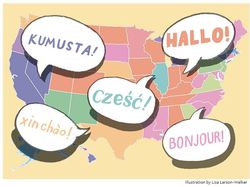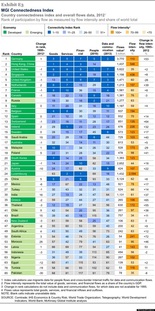 Slate published a fascinating article with several different maps showing which languages are most prevalent in each state. It starts to get really interesting when Mr. Blatt filters out Spanish and English. So what are people speaking in your state?
0 Comments
 Economies thrive on the global exchange of goods, services, people and information. The U.S. used to head the list of globally connected countries, but the latest data from McKinsey Global Institute and the McKinsey High Tech Practice shows that Germany now tops the chart followed by Hong Kong. The U.S. has sunk to 3rd place. And what about global powerhouse China? It is in 25th place, largely due to restrictions on the flow of people and information. Why does global connectedness matter? This research shows that the more connected a country is, the faster it's GDP grows.  A Harvard Business School study examined the present and future tense constructions of different languages and discovered people who speak languages whose tense constructs were similar prepare better for the future than those who speak languages that have different structures for present and future tenses. What does that mean? If you speak French, English, or Korean you're more likely to be obese, less likely to save for retirement, and less likely to take actions to stave off climate change. Swedes, Germans, and Chinese are more likely to take actions today that are socially responsible for the future. The good news? As a corporation becomes more global, the language effect decreases. One more reason to hire with diversity in mind. http://hbswk.hbs.edu/item/7479.html |
Author
Archives
March 2024
Categories
All
|
Photos from : : Ys [waiz] : :, bjahind, fabola, MattysFlicks, @sage_solar, LoS, Traducción e Interpretación, Kyle Taylor, Dream It. Do It., _gee_, keepitsurreal, One Way Stock, Airviewsphotos, GotCredit, efile989, Benoit cars, ** RCB **, stephiesal853, Francisco Anzola, Highways England, ITU Pictures, VIPevent, leoplus, Karsten Bitter, Jolante, jobstop11, Nguyen Vu Hung (vuhung), jurvetson, mikefats, YooSan, sandrafdzh, roland, mikecogh, y entonces, Donald Lee Pardue, Gatorgoon, daniel0685, BÜNDNIS 90/DIE GRÜNEN, rick, {Guerrilla Futures | Jason Tester}, mikecogh, markyharky, amslerPIX, jo.sau, IAEA Imagebank, lisa-skorpion, Toronto Public Library Special Collections, Wootang01

 RSS Feed
RSS Feed
